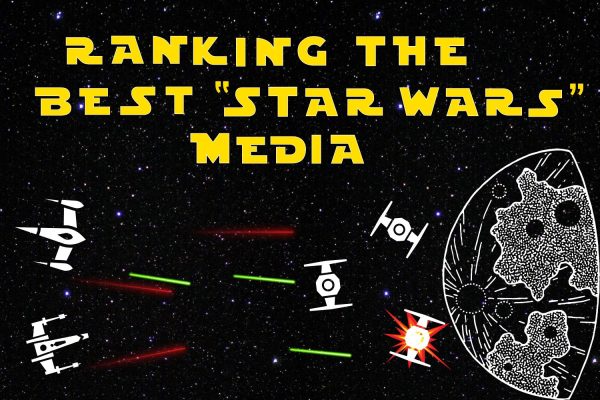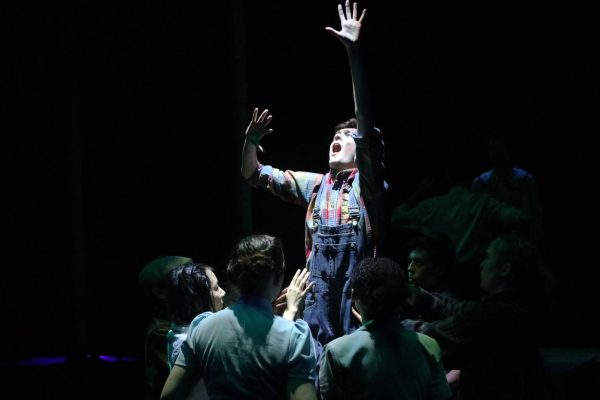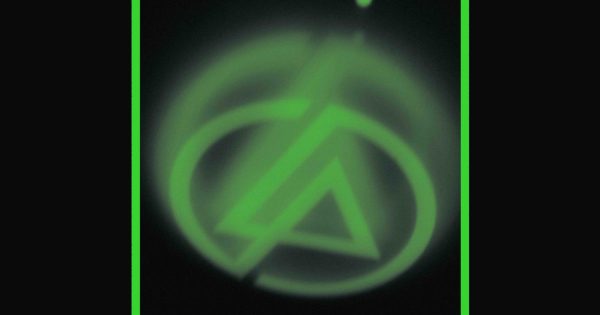“The Tower of Nero” offers a lackluster conclusion to vibrant 15-year “Percy Jackson” series
“The Tower of Nero,” the final book in the three-series Camp Half Blood Chronicles by Rick Riordan was released on Oct. 6. The first series, “Percy Jackson and the Olympians,” focuses on an unlucky New York kid, Percy Jackson, who finds that the world of ancient Greece lives interspersed within the modern world, and that the father he never knew is Greek god Poseidon.
Percy Jackson then goes on a series of quests with his new demigod friends to save the world from Titans’ evil plots. The second series, “The Heroes of Olympus,” features many of the Greek demigods the audience came to love in the first series with the addition of Roman demigods. The final series, “The Trials of Apollo,” features Apollo, a Greek god, who has been temporarily condemned to service as a mortal on earth. Apollo comes to earth at a time in which some of history’s most infamous leaders are returning from the dead: Roman emperors. Apollo and his new-found friends must go on a cross-country quest to save the world from this impending threat.
When I read “The Lighting Thief” in 6th grade, I knew I had found a new favorite. I loved books and found Greek mythology interesting, so the Percy Jackson books solidified both of these interests. My love for the early Percy Jackson books is simple, but my opinion on the last series is a little more complex.
Altogether, “The Trials of Apollo” series preserves the signature wit and lighthearted feel of the Percy Jackson series. “The Trials of Apollo” series follows in the same vein as the first two series of the “Camp Half Blood Chronicles,” combining routine childhood occasions such as going to summer camp and learning how to drive with a supernatural backdrop. I loved seeing these aspects preserved throughout the series.
In this series, Apollo braves the mortal world with Meg McCaffrey, a child of Demeter, as they attempt to stop undead Roman emperors Nero, Commodus and Caligula’s nefarious plans. Unfortunately, this series wavers between relying on old characters for the affection previously established and introducing an excessive number of new, unmemorable characters. I felt like the plot was convoluted in places, making this series entirely too long and tedious.
“The Tower of Nero” picks up where “The Tyrant’s Tomb” leaves off, with Apollo and Meg leaving Camp Jupiter in San Francisco to go defeat Nero, the final emperor of the Triumvirate and his evil serpentine partner, Python. This last book fittingly shares the same location as the first 15 years ago: Manhattan, New York.
As the last one in a 15 year-long series, this book is the dullest in comparison. This far into the story, the charm of the previous books has faded significantly. For some reason, this book felt more like a methodical sequence of events than a vivid story. The amount of humorous, disarming pop cultural references in “The Tower of Nero” was significantly fewer. Characters from earlier series displayed inconsistent behavior compared to their previous characterization. This was frustrating as it nearly felt as if the author had forgotten his own characters. Even the moral development of the protagonist went from subtle to patronizingly overt.
Another flaw: the villain of this book, Nero, was made into a caricature of a cartoon villain. This was disappointing considering Nero’s historical reputation was sinister.
Despite my complaints, I did enjoy one part of this book: the gradual progression of Apollo and Meg’s relationship from bickering siblings to siblings who bicker, but also love each other.
I can not say I enjoyed this book, but it is satisfying to say that I read the whole series, the good and the bad. Overall, I would not recommend this series to anyone looking for books identical to the first two or anyone looking for sophisticated literature. I only recommend this book series to those who are dying to read for themselves how the Percy Jackson series ended.
If you decide not to finish this series, this is still far from the end for Camp Half-Blood. After a few botched movie adaptations, Riordan has announced that a Disney Plus TV adaptation of the first series is in the works. This time, he will be more heavily involved in the Percy Jackson and the Olympians adaptation, even writing the script.
After the disappointment of this final book, I’m closing the book on Camp Half-Blood and eagerly anticipating visiting on-screen.

Senior Katherine Parker is the managing editor and this is her second year on staff. She loves journaling and spending time outdoors. In her free time,...













Katherine Parker • Nov 2, 2020 at 5:22 PM
Thank you for the comment, Issa. That’s very interesting that you started reading from the second series! In retrospect, the first series is my favorite. I agree entirely with you critiques as well!
Issa Fu • Nov 1, 2020 at 7:38 PM
This is the most accurate review of the series so far. Thank you for taking the time to review it!
Issa Fu • Nov 1, 2020 at 7:34 PM
This was such an accurate review and exactly what I expected to read from anyone who took the time to read all of the book series, starting from Percy Jackson and the Olympians. As someone who started reading from The Lost Hero, the second series, I immediately felt deeply attached to all the new main characters, especially because of how real they felt to tweens/teens living a crazy, fantasy-blended reality (despite many readers arguing that the characters were bland and unnecessary). Sadly, after reading this series (or at least attempting to, because it was honestly painful having to force myself to read these Trials of Apollo books because of how different they truly are), I felt so let down by the constant inconsistencies suffered from the author’s impulsive way of expressing his political ideals. He took so many 180 degree turns on his main characters from previous books, in how they felt towards one another, in how they act and feel, that it felt like another author was writing the books. He would constantly resort to needless (and even senseless) deaths for shock value, which unfortunately diminished the series’ credibility overall, as well as its charm, in my opinion. Like you said, fans can rest assured they did not miss out on much by skipping these last books. If only we could all unanimously agree to forget about the Trials of Apollo series like if it never happened; might do some good, maybe.
Brooke English • Oct 18, 2020 at 9:15 PM
This is a great review, Katherine.
Unfortunately my worst fears about the finale were confirmed. I thought it would be difficult for Rick R. to maintain the high level writing which catapulted this series to fame.
But as a true fan, I will still read this final book.
Avery Sponsler • Oct 18, 2020 at 8:06 PM
I absolutely agree with everything you said – especially the author forgetting his own characters. I had to force myself to finish “The Hidden Oracle” so I’m glad to hear that I’m not missing anything by not finishing the series.